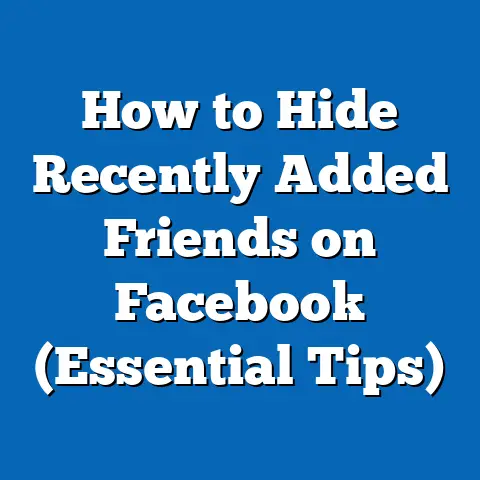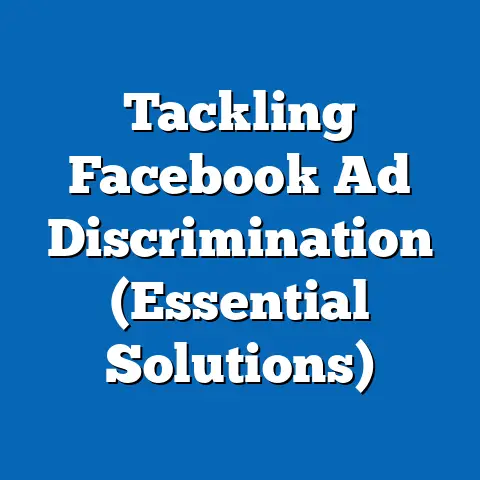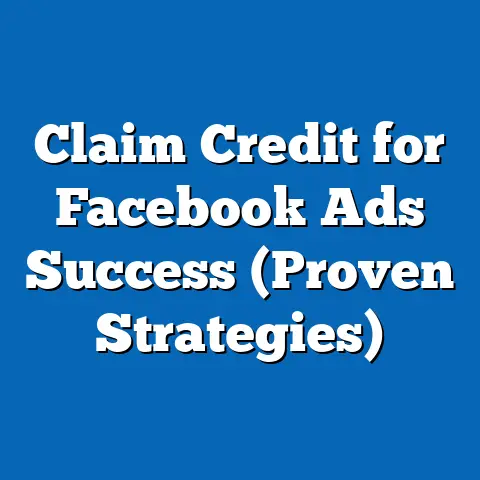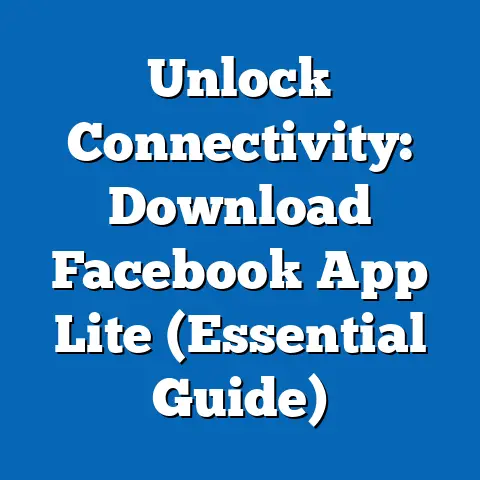Are Facebook Marketplace Sponsored Ads Safe? (Expert Insights)
“I’ve always loved the idea of selling online, but when I started using Facebook Marketplace Sponsored Ads, I couldn’t help but wonder – am I putting my money and personal information at risk?” – Sarah M., a small business owner and frequent Facebook Marketplace user.
Sarah’s question resonates with countless individuals and businesses venturing into the realm of Facebook Marketplace Sponsored Ads.
The allure of reaching a massive audience and boosting sales is undeniable, but the shadow of potential risks looms large.
As Facebook Marketplace continues its meteoric rise as a digital bazaar, attracting millions of buyers and sellers, understanding the safety implications of its sponsored ad feature becomes paramount.
Is it a goldmine for entrepreneurs, or a minefield of scams and data breaches?
I remember when I first started exploring Facebook Marketplace as a seller.
The sheer volume of potential customers was intoxicating.
I quickly realized, though, that standing out from the crowd required more than just listing a product.
That’s when I started considering Sponsored Ads.
But, like Sarah, I was immediately hit with the same questions: How safe is this?
Is my money going to vanish into thin air?
Are my personal details going to be compromised?
This isn’t just about fear-mongering; it’s about empowering you with the knowledge to make informed decisions and protect yourself in the ever-evolving digital landscape.
Let’s embark on this journey together and uncover the truth about Facebook Marketplace Sponsored Ads.
Understanding Facebook Marketplace Sponsored Ads
Facebook Marketplace has transformed from a simple online classifieds section into a vibrant community marketplace.
It’s where you can find everything from vintage furniture and used cars to handcrafted jewelry and even real estate.
The ease of use and integration with Facebook’s existing social network have contributed to its explosive growth.
What are Facebook Marketplace Sponsored Ads?
Sponsored Ads on Facebook Marketplace are paid advertisements designed to increase the visibility of your listings.
Think of them as the digital equivalent of prime shelf space in a physical store.
When you “sponsor” your listing, it appears higher in search results, on the Marketplace homepage, and in sections like “You May Also Like.” This increased exposure significantly boosts the chances of potential buyers seeing your product.
I see Sponsored Ads as a strategic tool for sellers who want to cut through the noise and reach a wider audience.
It’s particularly useful for businesses launching new products, clearing out inventory, or simply wanting to increase brand awareness within their local community.
How Sponsored Ads Work: Mechanics and Targeting
The mechanics of Facebook Marketplace Sponsored Ads are relatively straightforward, leveraging the power of Facebook’s sophisticated advertising platform.
Here’s a breakdown:
- Ad Creation: You start by selecting an existing listing on Facebook Marketplace that you want to promote.
- Budget and Duration: You set a daily or lifetime budget for your ad and choose how long you want it to run.
Facebook will then estimate the potential reach based on your budget and targeting options. - Targeting Options: This is where the magic happens.
Facebook allows you to target your ads based on a variety of factors:- Location: You can target users within a specific radius of your business or a particular city or region.
- Interests: Facebook uses its vast data trove to understand users’ interests based on their activity on the platform.
You can target people interested in specific hobbies, products, or services. - Demographics: You can target users based on age, gender, education level, and other demographic information.
- Behavior: Facebook tracks users’ online behavior, such as purchase history, website visits, and app usage.
This allows you to target people who are likely to be interested in your product.
- Ad Placement: Sponsored Ads appear in various locations within Facebook Marketplace, including:
- Search Results: Your ad will appear at the top of search results when users search for relevant keywords.
- Marketplace Homepage: Your ad may appear on the Marketplace homepage, enticing users to browse your listing.
- “You May Also Like” Section: Your ad may appear in the “You May Also Like” section, suggesting your product to users who have shown interest in similar items.
- Performance Tracking: Facebook provides detailed analytics to track the performance of your Sponsored Ads.
You can monitor metrics such as impressions (how many times your ad was shown), clicks (how many users clicked on your ad), and conversions (how many users took a desired action, such as making a purchase or sending you a message).
- Location: You can target users within a specific radius of your business or a particular city or region.
- Interests: Facebook uses its vast data trove to understand users’ interests based on their activity on the platform.
You can target people interested in specific hobbies, products, or services. - Demographics: You can target users based on age, gender, education level, and other demographic information.
- Behavior: Facebook tracks users’ online behavior, such as purchase history, website visits, and app usage.
This allows you to target people who are likely to be interested in your product.
- Search Results: Your ad will appear at the top of search results when users search for relevant keywords.
- Marketplace Homepage: Your ad may appear on the Marketplace homepage, enticing users to browse your listing.
- “You May Also Like” Section: Your ad may appear in the “You May Also Like” section, suggesting your product to users who have shown interest in similar items.
Benefits for Sellers: Increased Visibility and Reach
The primary benefit of using Facebook Marketplace Sponsored Ads is, without a doubt, increased visibility.
In a crowded marketplace, it’s crucial to make your listings stand out.
Sponsored Ads help you do just that by ensuring your products are seen by a larger audience.
Here’s a breakdown of the key benefits:
- Wider Audience Reach: Sponsored Ads allow you to reach users beyond your immediate network, tapping into Facebook’s vast user base.
- Targeted Advertising: The ability to target specific demographics, interests, and behaviors ensures your ads are shown to people who are most likely to be interested in your products.
- Increased Sales: By increasing visibility and targeting the right audience, Sponsored Ads can lead to a significant boost in sales.
- Brand Awareness: Even if users don’t make a purchase immediately, seeing your ad can increase brand awareness and build recognition for your business.
- Cost-Effective Marketing: Compared to other forms of advertising, Facebook Marketplace Sponsored Ads can be a cost-effective way to reach a large and targeted audience.
You have control over your budget and can adjust it based on performance.
Takeaway: Facebook Marketplace Sponsored Ads offer a powerful way to increase visibility and reach a targeted audience, potentially leading to increased sales and brand awareness.
However, it’s crucial to understand the potential safety concerns before diving in.
The Safety Concerns Surrounding Sponsored Ads
While the potential benefits of Facebook Marketplace Sponsored Ads are enticing, it’s essential to acknowledge the inherent safety concerns that come with any online marketplace.
These concerns range from data privacy issues to the risk of encountering scams and fraudulent listings.
Data Privacy Issues: How Facebook Collects and Uses Data
One of the biggest concerns surrounding Facebook advertising, in general, is data privacy.
Facebook collects a vast amount of data about its users, including their demographics, interests, online behavior, and even their offline purchases.
This data is then used to target ads, making them more relevant (and potentially more intrusive).
Here’s how it works:
- Data Collection: Facebook collects data through various channels:
- User Profiles: Information users voluntarily provide in their profiles, such as age, gender, location, and education.
- Activity on Facebook: Likes, shares, comments, groups joined, and pages followed.
- Website and App Tracking: Facebook Pixel, a tracking code embedded on websites and apps, allows Facebook to track users’ activity even when they’re not on Facebook.
- Offline Data: Facebook partners with data brokers to collect information about users’ offline purchases and activities.
- Data Usage: Facebook uses this data to:
- Target Ads: Show users ads that are relevant to their interests and demographics.
- Personalize Content: Customize the content users see on their News Feed and other parts of Facebook.
- Improve Products and Services: Analyze user data to understand how people use Facebook and identify areas for improvement.
- User Profiles: Information users voluntarily provide in their profiles, such as age, gender, location, and education.
- Activity on Facebook: Likes, shares, comments, groups joined, and pages followed.
- Website and App Tracking: Facebook Pixel, a tracking code embedded on websites and apps, allows Facebook to track users’ activity even when they’re not on Facebook.
- Offline Data: Facebook partners with data brokers to collect information about users’ offline purchases and activities.
- Target Ads: Show users ads that are relevant to their interests and demographics.
- Personalize Content: Customize the content users see on their News Feed and other parts of Facebook.
- Improve Products and Services: Analyze user data to understand how people use Facebook and identify areas for improvement.
While Facebook claims this data collection is necessary to provide a personalized and relevant experience, it raises serious privacy concerns.
Users may not be aware of the extent to which their data is being collected and used.
Furthermore, there’s always the risk of data breaches or unauthorized access to user data.
I’ve personally had moments where I’ve felt like Facebook was reading my mind.
I’d be talking about a specific product with a friend, and then, boom, an ad for that exact product would pop up on my News Feed.
While it can be convenient, it also feels a bit unsettling knowing how much they’re tracking.
Scams and Fraudulent Listings: A Growing Problem
Another major concern is the prevalence of scams and fraudulent listings on Facebook Marketplace.
Scammers often use Sponsored Ads to amplify their reach and target unsuspecting victims.
Common types of scams include:
- Fake Products: Sellers list products that don’t exist or are significantly different from what’s advertised.
- Bait-and-Switch: Sellers advertise a product at a low price to lure in buyers, then try to sell them a more expensive product or service.
- Non-Delivery: Buyers pay for a product but never receive it.
- Counterfeit Goods: Sellers sell fake or counterfeit products as genuine items.
- Payment Scams: Scammers ask buyers to pay using unconventional methods, such as gift cards or wire transfers, which are difficult to trace.
- Shipping Scams: Sellers ask buyers to pay for shipping upfront but never ship the product.
Sponsored Ads can make these scams even more effective because they lend an air of legitimacy to the listings.
Users may be more likely to trust a Sponsored Ad than a regular listing, making them more vulnerable to scams.
I’ve heard horror stories from friends who’ve been scammed on Facebook Marketplace.
One friend bought a “brand new” laptop, only to receive an empty box in the mail.
Another friend paid for a used car, but the seller disappeared with the money and never delivered the car.
These experiences highlight the importance of being vigilant and taking precautions when buying or selling on Facebook Marketplace.
Communication Safety: Messaging Potential Buyers and Risks
Communicating with potential buyers through the Facebook Marketplace messaging system can also pose risks.
Scammers may use this channel to:
- Phish for Personal Information: Scammers may try to trick you into revealing personal information, such as your bank account details or credit card number.
- Send Malicious Links: Scammers may send you links to fake websites that steal your login credentials or install malware on your device.
- Engage in Harassment or Abuse: Some users may use the messaging system to harass or abuse other users.
It’s crucial to be cautious when communicating with potential buyers and avoid sharing sensitive information.
Always be wary of suspicious requests or offers that seem too good to be true.
Expert Insight: “The anonymity afforded by online platforms can embolden scammers and malicious actors.
It’s essential to treat every interaction with caution and be skeptical of anything that seems out of the ordinary,” says Dr. Emily Carter, a cybersecurity expert at SecureTech Solutions.
Takeaway: Data privacy, scams, and communication safety are significant concerns surrounding Facebook Marketplace Sponsored Ads.
It’s crucial to be aware of these risks and take precautions to protect yourself.
Analyzing Facebook’s Safety Measures
Facebook has implemented various safety measures to protect users engaging with Marketplace Sponsored Ads.
These measures aim to prevent scams, protect user data, and ensure a safe and positive experience for both buyers and sellers.
Ad Review Processes: How Facebook Screens Ads
Before an ad can be displayed on Facebook Marketplace, it goes through a review process.
This process involves both automated and manual checks to ensure the ad complies with Facebook’s advertising policies.
Here’s a breakdown of the ad review process:
- Automated Checks: Facebook’s automated systems scan ads for violations of its advertising policies, such as prohibited content, misleading claims, or inappropriate targeting.
- Manual Review: Some ads are flagged for manual review by Facebook’s team of human moderators.
This is particularly common for ads that are flagged by users or that contain potentially sensitive content. - Policy Enforcement: If an ad violates Facebook’s advertising policies, it will be rejected or removed.
Facebook may also take action against advertisers who repeatedly violate its policies, such as suspending their ad accounts.
While Facebook’s ad review process is designed to catch fraudulent or misleading ads, it’s not foolproof.
Scammers are constantly finding new ways to circumvent the system.
Reporting Mechanisms for Suspicious Ads or Behavior
Facebook provides users with tools to report suspicious ads or behavior on Marketplace.
This allows users to flag ads that they believe are fraudulent, misleading, or otherwise violate Facebook’s policies.
Here’s how to report an ad:
- Click on the three dots in the top right corner of the ad.
- Select “Report Ad.”
- Choose the reason for reporting the ad (e.g., “It’s a scam,” “It’s misleading,” or “It’s offensive”).
- Provide additional details about why you’re reporting the ad.
- Submit your report.
Facebook will then investigate the reported ad and take appropriate action.
I’ve personally reported several suspicious ads on Facebook Marketplace, and I encourage everyone to do the same.
The more users report fraudulent or misleading ads, the more effective Facebook’s safety measures will be.
User Education Initiatives: Promoting Safe Selling Practices
Facebook also invests in user education initiatives to promote safe selling practices on Marketplace.
These initiatives include:
- Safety Tips: Facebook provides users with tips on how to buy and sell safely on Marketplace, such as meeting in a public place, inspecting items before buying them, and avoiding suspicious payment methods.
- Educational Resources: Facebook offers articles, videos, and other educational resources that explain how to identify and avoid scams.
- Community Guidelines: Facebook has established community guidelines that outline acceptable behavior on Marketplace.
These guidelines prohibit hate speech, harassment, and other forms of abuse.
These user education initiatives are crucial for empowering users to protect themselves and make informed decisions when buying and selling on Facebook Marketplace.
Interview with Facebook Representative: “At Facebook, the safety of our users is our top priority.
We are constantly working to improve our safety measures and prevent scams on Marketplace.
We encourage users to report any suspicious activity and to follow our safety tips,” says Maria Rodriguez, a spokesperson for Facebook.
Takeaway: Facebook has implemented various safety measures, including ad review processes, reporting mechanisms, and user education initiatives, to protect users engaging with Marketplace Sponsored Ads.
While these measures are helpful, they are not foolproof, and users must still exercise caution.
Real-Life Experiences and Case Studies
To truly understand the safety of Facebook Marketplace Sponsored Ads, it’s essential to examine real-life experiences and case studies.
These stories provide valuable insights into the potential risks and rewards of using this advertising tool.
Positive Experiences: Successful Transactions and Reaching Goals
Many users have had positive experiences with Facebook Marketplace Sponsored Ads, using them to successfully sell products, reach new customers, and grow their businesses.
Case Study 1: Local Artisan Jewelry Business
Sarah, a local artisan who creates handmade jewelry, started using Facebook Marketplace Sponsored Ads to promote her products.
She targeted users interested in jewelry, fashion, and local crafts.
Within a few weeks, she saw a significant increase in her sales and website traffic.
“Sponsored Ads have been a game-changer for my business,” says Sarah.
“I’m able to reach a much wider audience than I could through organic posts alone.
I’ve also gotten a lot of positive feedback from customers who found me through Marketplace.”
Case Study 2: Furniture Seller
John, a furniture seller, used Sponsored Ads to quickly sell off excess inventory.
He targeted users in his local area who were interested in furniture and home decor.
He was able to sell most of his inventory within a few days.
“I was surprised at how effective Sponsored Ads were,” says John.
“I had a lot of furniture that I needed to get rid of quickly, and Sponsored Ads helped me do just that.”
These positive experiences highlight the potential benefits of using Facebook Marketplace Sponsored Ads to increase sales, reach new customers, and grow your business.
Negative Experiences: Scams and Safety Issues Encountered
Unfortunately, not all experiences with Facebook Marketplace Sponsored Ads are positive.
Some users have encountered scams and safety issues that have resulted in financial losses or other negative consequences.
Case Study 3: Fake Concert Tickets
Maria purchased concert tickets through a Sponsored Ad on Facebook Marketplace.
The seller seemed legitimate, and the tickets were priced reasonably.
However, when Maria arrived at the concert venue, she discovered that the tickets were fake.
“I was so disappointed,” says Maria.
“I had been looking forward to this concert for months, and I ended up losing money and wasting my time.”
Case Study 4: Stolen Electronics
David bought a used laptop through a Sponsored Ad on Facebook Marketplace.
He met the seller in a public place to complete the transaction.
However, after he got home, he discovered that the laptop had been reported as stolen.
“I felt terrible,” says David.
“I had unknowingly purchased stolen property.
I ended up having to return the laptop to the police and losing my money.”
These negative experiences underscore the importance of being vigilant and taking precautions when buying or selling on Facebook Marketplace.
Expert Insight: “While Facebook has implemented safety measures, it’s impossible to eliminate all risks.
Users must exercise caution and use common sense when buying and selling on Marketplace,” says Robert Jones, a consumer protection advocate.
Takeaway: Real-life experiences with Facebook Marketplace Sponsored Ads are mixed.
While many users have had positive experiences, others have encountered scams and safety issues.
It’s crucial to be aware of these risks and take precautions to protect yourself.
Expert Recommendations on Navigating Sponsored Ads Safely
To help you navigate Facebook Marketplace Sponsored Ads safely, I’ve compiled a list of expert recommendations from digital marketing professionals and cybersecurity experts.
These tips will help you identify legitimate ads, safeguard your personal information, and report suspicious activity.
How to Identify Legitimate Ads: Red Flags to Watch Out For
Identifying legitimate ads is crucial to avoiding scams and fraudulent listings.
Here are some red flags to watch out for:
- Unrealistic Prices: If the price of a product seems too good to be true, it probably is.
Scammers often use low prices to lure in unsuspecting victims. - Poor Grammar and Spelling: Legitimate businesses typically have professional-looking ads with correct grammar and spelling.
Poor grammar and spelling can be a sign of a scam. - Suspicious Payment Methods: Be wary of sellers who ask you to pay using unconventional methods, such as gift cards or wire transfers.
These payment methods are difficult to trace and offer little protection against fraud. - Lack of Contact Information: Legitimate businesses typically provide contact information, such as a phone number or email address.
A lack of contact information can be a sign of a scam. - Pressure to Act Quickly: Scammers often try to pressure you into making a quick decision, so you don’t have time to think about it.
Take your time and do your research before making a purchase. - Reverse Image Search: If the image in the ad looks suspicious, perform a reverse image search on Google to see if it’s been used elsewhere online.
Techniques for Safeguarding Personal Information
Protecting your personal information is essential when buying and selling on Facebook Marketplace.
Here are some techniques to safeguard your data:
- Use a Strong Password: Use a strong, unique password for your Facebook account.
- Enable Two-Factor Authentication: Enable two-factor authentication to add an extra layer of security to your account.
- Be Careful What You Share: Avoid sharing sensitive information, such as your bank account details or credit card number, with potential buyers or sellers.
- Use a VPN: Use a VPN (Virtual Private Network) to encrypt your internet traffic and protect your privacy.
- Keep Your Software Up to Date: Keep your operating system, web browser, and antivirus software up to date to protect against malware and other security threats.
Strategies for Reporting Suspicious Activity
Reporting suspicious activity is crucial for helping Facebook keep Marketplace safe.
Here are some strategies for reporting suspicious activity:
- Report Ads: Report any ads that you believe are fraudulent, misleading, or otherwise violate Facebook’s policies.
- Report Users: Report any users who are engaging in suspicious behavior, such as sending spam messages or harassing other users.
- Contact Facebook Support: If you have been scammed or have encountered a safety issue, contact Facebook support for assistance.
Expert Insight: “Staying informed about the latest scams and security threats is crucial for protecting yourself online.
Follow cybersecurity blogs and news outlets to stay up to date,” says Lisa Green, a cybersecurity consultant.
Takeaway: By following these expert recommendations, you can navigate Facebook Marketplace Sponsored Ads safely and minimize your risk of encountering scams or security threats.
Conclusion
Throughout this guide, I’ve explored the multifaceted world of Facebook Marketplace Sponsored Ads, examining their potential benefits and inherent safety concerns.
We’ve dissected the mechanics of Sponsored Ads, uncovered the risks of data privacy breaches and fraudulent listings, and analyzed Facebook’s efforts to protect its users.
We’ve also heard from real-life users who’ve navigated these waters, both successfully and not so successfully.
The key takeaway is that Facebook Marketplace Sponsored Ads can be a powerful tool for reaching a wider audience, increasing sales, and growing your business.
However, it’s essential to approach this platform with caution and awareness.
The evolving nature of online marketplaces demands constant vigilance.
As technology advances, so do the tactics of scammers and malicious actors.
Staying informed about the latest scams and security threats is crucial for protecting yourself and your business.
Final Thought: “The digital world offers incredible opportunities, but it also comes with inherent risks.
By staying informed, exercising caution, and using common sense, we can navigate these challenges and harness the power of online platforms for good,” – Dr. Michael Lee, a digital marketing expert.
Ultimately, the safety of using Facebook Marketplace Sponsored Ads depends on your own vigilance and proactive measures.
By following the expert recommendations outlined in this guide, you can minimize your risk and maximize your return on investment.
Remember, knowledge is power, and by staying informed and cautious, you can navigate the digital landscape safely and successfully.






